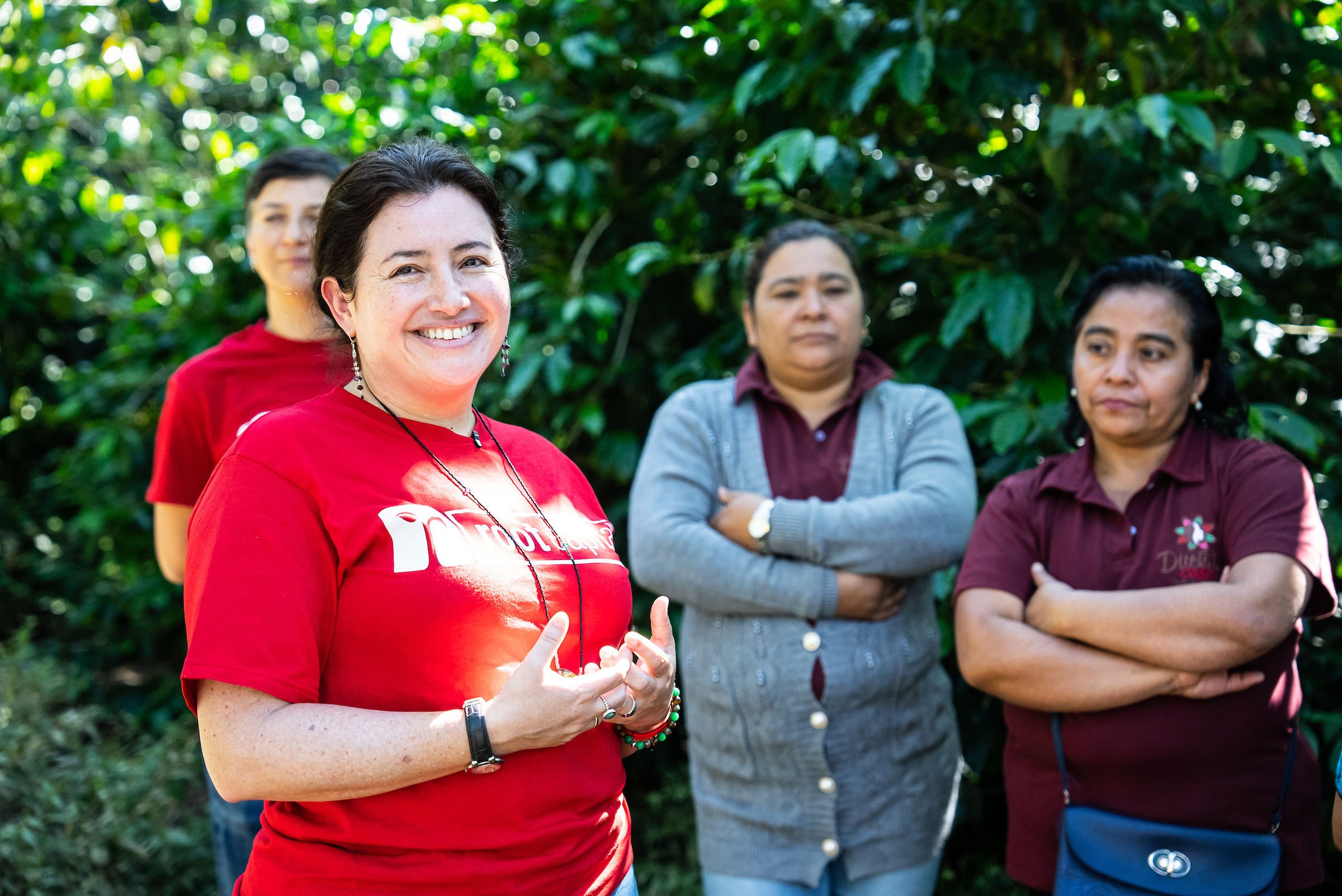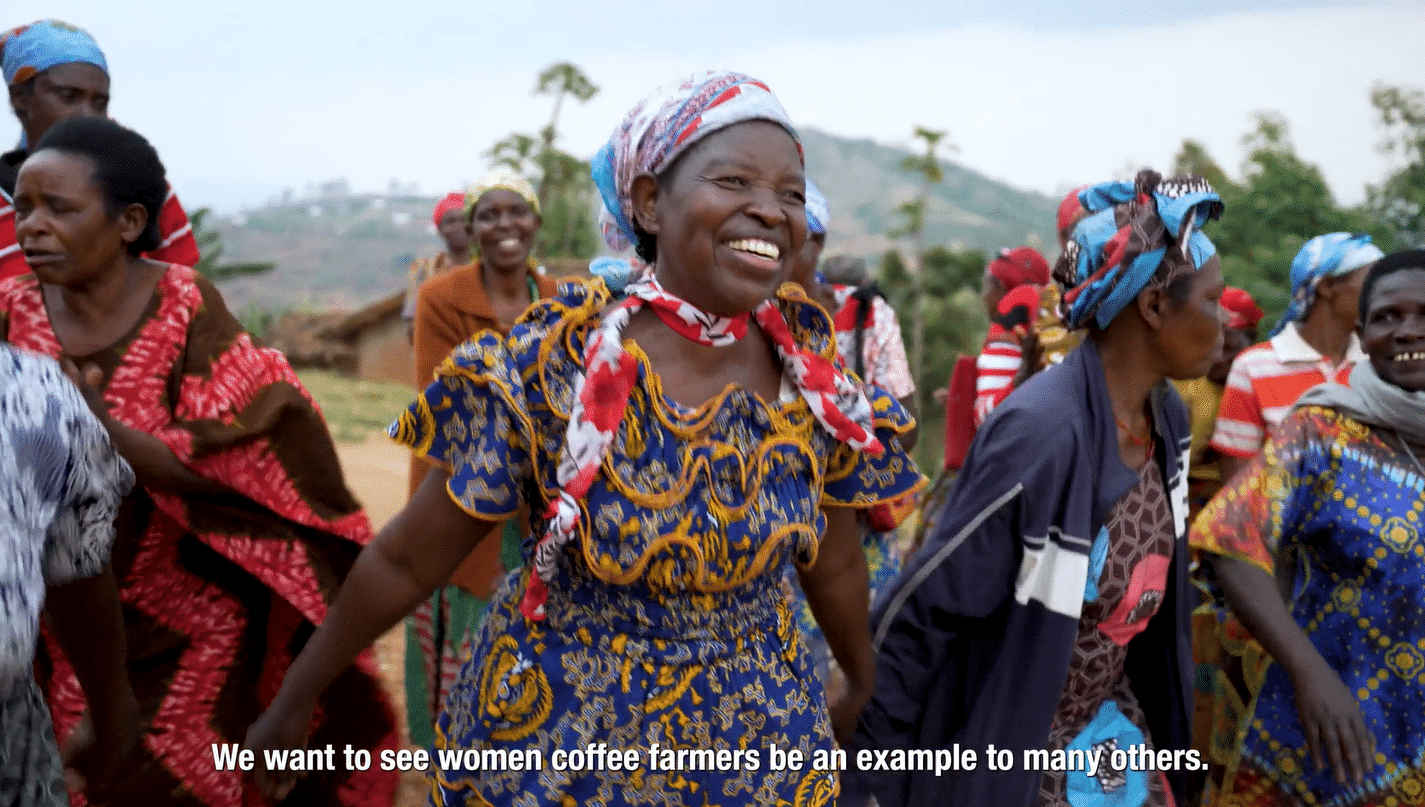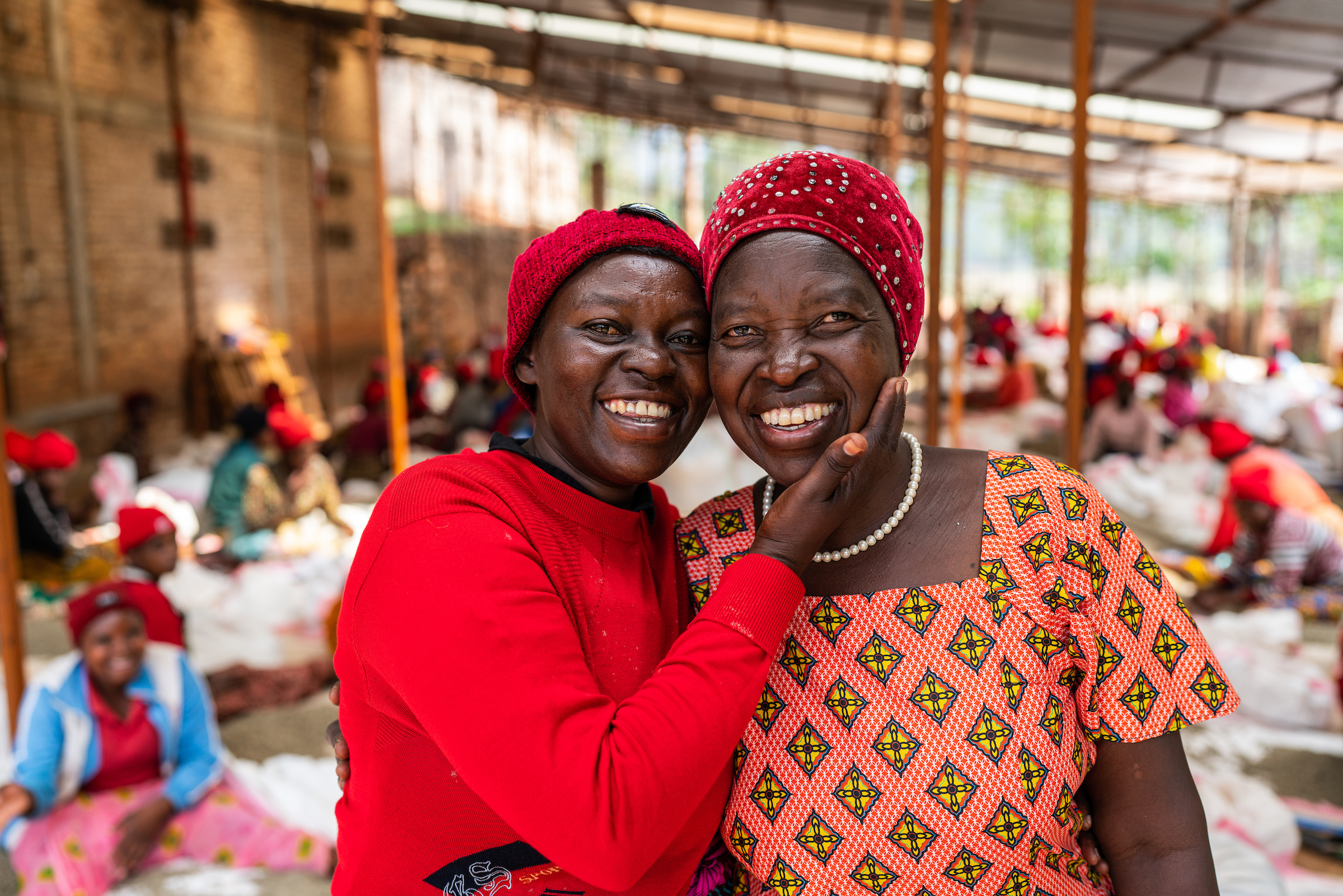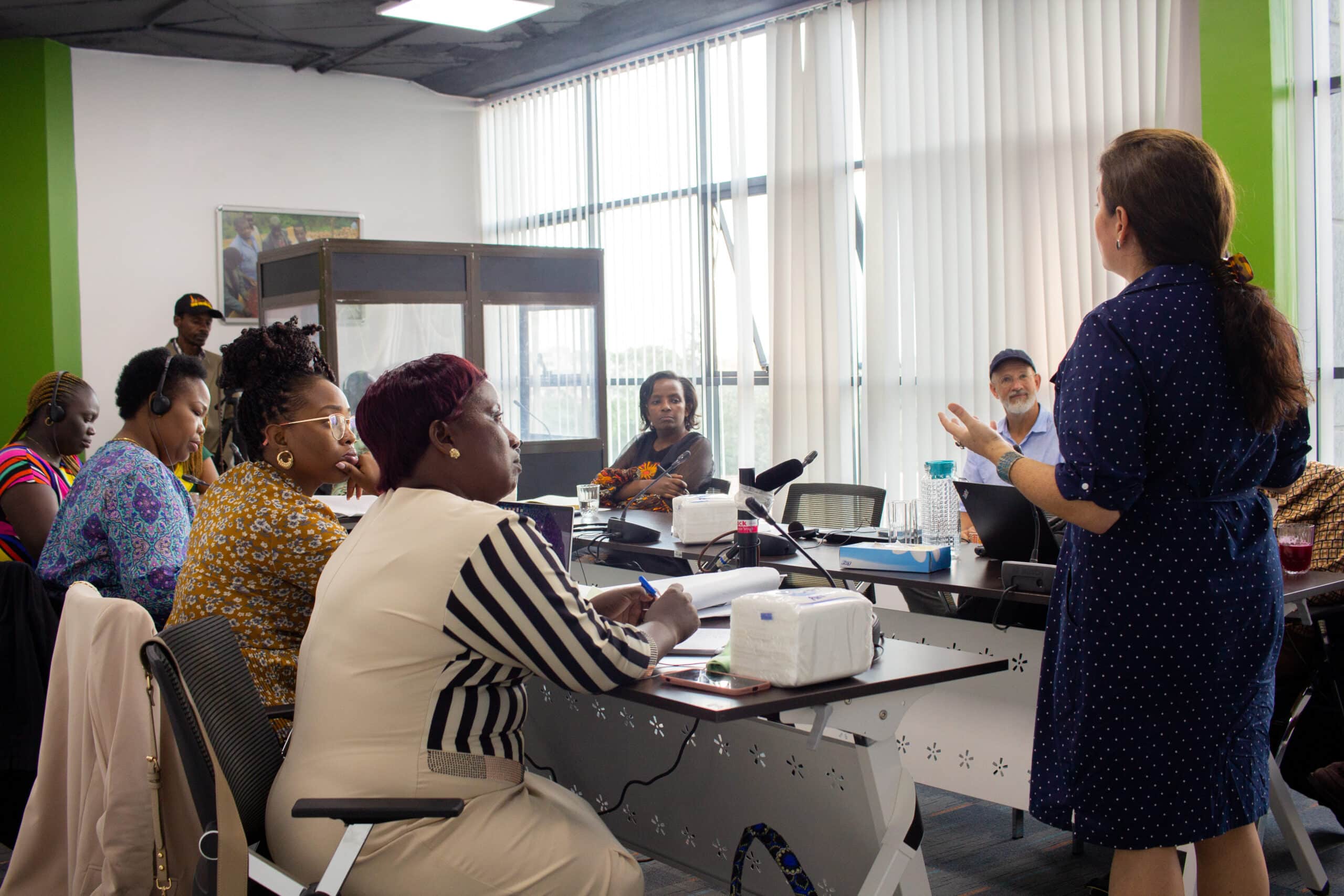
Leonor Gutiérrez on a 2022 WAI trip to Guatemala. Photo Credit: Adam Finch
Root Capital provides compelling evidence that the business case for building more inclusive lending portfolios in the agriculture sector is strong. However, financial institutions and investors have traditionally struggled to reach women-led and gender-inclusive enterprises through traditional investment approaches. Consequently, only 7% of total agricultural investment goes to women. Root Capital recognizes the potential to transform this reality by supporting other impact investors in building gender-inclusive lending portfolios.
In late June, I participated in a webinar hosted by Value for Women and the Council on Smallholder Agricultural Finance (CSAF), alongside colleagues from Incofin, Alterfin, and Cordaid Investment Management (CIM), that explored how agricultural finance can do a better job of reaching marginalized, rural women.
The webinar was based upon key findings from the recently released report, Closing the Gender Gap in Agricultural Investments: How Three CSAF Investors Are Turning Gender Intention Into Action. The report features case studies on Incofin, Alterfin, and Cordaid Investment Management, three impact investors who were able to successfully turn their gender intentions into action by focusing on the Gender Lens Investing (GLI) strategies most aligned with their business and impact priorities. Root Capital, in collaboration with Value for Women and CSAF, provided comprehensive GLI training to these three investors as part of our Strengthening the Livelihoods of Women Smallholders through Investments in Gender-Inclusive and Women-Led Agricultural Businesses project. The project aims to establish a replicable model and evidence base for other donors and investors to adopt GLI practices.
Download Report
In addition to advancing gender equity goals among CSAF investors, the webinar was a wonderful way to connect with peers that share my passion for gender equity. It was inspiring to see how many curious, engaged participants took time out of their busy days to hear about our shared challenges and lessons learned.
Below are key takeaways from the discussion:
1. Collaboration is key.
At Root Capital, we have long known that collective action is necessary to achieve real impact in agricultural investment because the financing gap is immense. With the global investment gap in women in agriculture in the trillions of dollars, sustaining a collective effort is the only way we’ll see any real progress beyond the proverbial drop in the bucket. By collaborating with CSAF members and investors on webinars (like this one), reports, and case studies that share our learnings, we are amplifying our work and providing actionable examples on how to implement GLI.
2. Gender inclusion must be at the heart of any investment strategy.
At Root Capital, 84% of our clients have implemented gender-inclusive policies. We couldn’t have achieved this level of success without first establishing and then holding ourselves accountable to measurable, ambitious gender-inclusive goals. That’s why we’ve baked into our five-year strategic plan a commitment to distributing 900 million dollars in investments to women-led and gender-inclusive businesses by the year 2025.
Impact investor CIM has followed a similar vein-integrating gender into its new fund’s investment policies and measurement frameworks. CIM was also able to embed gender throughout its impact strategy and in its strategy documents and policies, including its ambition statement and theory of change.
3. Use qualitative and quantitative gender-inclusive indicators when measuring success.
This entails tracking more than just women-led and women-owned organizations; it means rewarding businesses that help women flourish. In practice, this includes measuring whether companies are not only hiring women, but also ensuring women have the opportunities to advance and that they aren’t excluded from certain departments or leadership positions.
Impact investor Alterfin, for example, has established qualitative gender indicators to ensure that portfolio companies are actively tailoring their products, services, and approaches to the specific needs of women. Their gender indicators measure whether companies:
- offer products or services that have a direct impact on or benefit for women;
- have designed or adapted their products and services to meet the specific needs of women customers;
- provide capacity building, training, or other forms of support that is tailored to women’s needs.
4. Beyond demonstrating a gender commitment to external stakeholders, model the commitment internally.
Since its inception in 2012, the Women in Agriculture (WAI) program has been central to demonstrating Root Capital’s gender commitment as part of our impact strategy. The program has also played a critical role in promoting gender equality and empowerment not only in our lending, but also in our internal operations. Alongside gender-focused actions on the lending side of the business, in 2018, we adopted a Gender Action Plan, which set out concrete activities to improve gender equity throughout the organization, including in hiring, communications, and operational practices. Root Capital also holds gender inclusion training at least once per year in all regional offices; all staff is included in these training sessions. Operating with a gender lens is more than an investment strategy at Root Capital, it also infuses our organizational culture and operations.
Impact investor Incofin has taken a similar approach, focusing on building internal buy-in for GLI, while also enhancing inclusive workplace policies and practices. Incofin now offers a flexible working model, provides more family-friendly benefits, and deploys internal gender training sessions.
Together, with the members of CSAF and other allied investors and partners, we’re working to make agriculture more inclusive. Our common vision is one where women have equal opportunities to thrive and contribute to the agricultural business sector. Watch the full webinar below to learn more.
Thanks to Walmart Foundation, whose generous support made this project and evaluation possible.
You may also be interested in...

VIDEO: Celebrating 10 Years of Our Women in Agriculture Initiative
Approximately, 2.5 billion people worldwide rely on small-scale agriculture for their livelihoods. Most of them live
Date:

Announcing Our New Women in Agriculture Annual Report
Women members of Koperative Abahuzamugambi Ba Kawa (Maraba), a coffee cooperative in Huye District, Rwanda. Photo
Date:

Meet the Women’s Council
Root Capital staff are joined by the founding members of the Women’s Council at the Nairobi,
Date:


